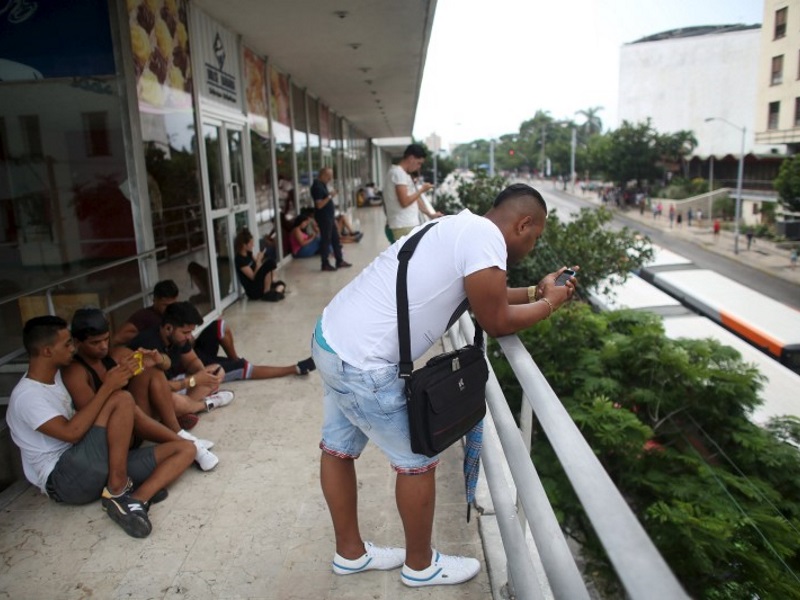- Home
- Internet
- Internet Features
- Relishing New Wi Fi, Cuba's Young Clamor for More
Relishing New Wi-Fi, Cuba's Young Clamor for More

Cuba's new Wi-Fi hotspots - 35 nationwide since July with more promised soon - are a sensation in a highly controlled country with one of the world's lowest Internet penetrations.
Yet young Cubans are not satisfied.
They want the Communist government to provide more, cheaper and less restricted Wi-Fi for Cuba's 11 million people.
"Everyone around the world has great Wi-Fi easily available these days. Why not us?" said Ariel Boggiano, 20, on Havana's La Rampa avenue after an hour's conversation with an uncle in Las Vegas via an app and a $2 card from the state phone company.
"We need more access, better prices ... And there are too many restrictions when you are surfing. There's not good access to news. And there's too much demand, it gets saturated fast," he added opposite a government sign reading: "Long Live Free Cuba!"
U.S. technology firms are keen to step in and help provide better service for Boggiano and friends, especially in the wake of diplomatic detente between Washington and Havana and an easing of some half-century-old U.S. trade restrictions.
Google executives have visited twice in the last two years.
The potential is obvious: less than a third of Cubans have access to the web, with only 3.4 percent of homes connected to either the Internet or a local Cuban Intranet, according to U.N. data. Cuba says it wants broadband in 50 percent of homes by 2020.
Ideological battleground
Declaring the development of Cuba's Internet a priority, the United States this year created exemptions to its comprehensive trade embargo to allow U.S. companies to sell equipment and services to Cubans and invest in telecommunications here.
Yet as with all aspects of change in Cuban society, President Raul Castro's government proceeds cautiously and at its own pace.
"Everyone knows why there isn't more Internet in Cuba, because it's very expensive," Vice-President Jose Ramon Machado Ventura, a hardline ideologue, told a state newspaper recently.
"Some want to give it to us for free, not so Cubans can communicate but to infiltrate us for ideological work ... We have to possess the Internet our way, knowing the imperialists aim to use it to destroy the Revolution."
While the government blames cost for lack of investment in internal infrastructure, critics suggest the real impediment is its fear of losing control on media and seeing new avenues of political opposition open up.
Ideological considerations do not impress many of the young Cubans hanging out at open-air hotspots in Havana and the eastern city of Santiago in the cool of the evening, fiddling with Galaxys and iPhones brought in from abroad.
In interviews, several said they were fed up with the ideological hang-ups of the older ruling generation, and simply want to watch films, access Facebook, and enjoy other online activities that are part of daily life for their equals abroad.
In Santiago on a recent evening, bars and clubs were empty while youths thronged plazas to use the new Wi-Fi service.
"We hadn't seen each other for nearly four years!" said Jesus Vazquez, 43, excited and emotional after a video call between him, his wife and youngest daughter in Santiago with two other daughters in the United States and Europe.
"It's a really good initiative. But I think they could make it cheaper," added the economist. The $2 hourly tariff represents about 10 percent of a typical monthly salary.
Internet ingenuity
Before the hotspots, broadband access had been limited largely to even pricier state Internet parlors and hotels
Dissident and pornography websites are blocked.
Cuba is connected by only one undersea fiber optic cable originating from Venezuela, although it still offers plenty of bandwidth given the low number of end users.
"There are multiple proposals before the Cuban government to have an undersea cable connected from Miami to Havana," said Daniel Sepulveda, a U.S. State Department official who has visited Cuba seeking access for U.S. companies.
"They tell us they're reviewing it but ... they're not using the full capacity of the Venezuela line so it's not their first priority."
State telecom Etecsa's executive president, Mayra Arevich Marin, has promised more Wi-Fi zones by the end of the year, with seats, shelter from the elements and cheaper prices. The $2 an hour is already an improvement on the old cost of $4.50.
Meanwhile, ever-ingenious Cubans do what they can to maximize what they have, some using hotspots from their phone to share - or sell - their coveted signal with others.
When Etecsa outlets run out of Internet cards, hawkers quietly appear selling them for a $1 markup.
Cubans' pent-up feelings over Internet access are obvious. A recent upbeat article on a government web site about the new 35 hotspots was bombarded with angry comments underneath.
One teacher complained that if he wants to go online for work-related research, one hour costs what he earns in two days. "I don't know of any teacher in the world without access to Internet ... it's an abuse," he wrote on the cubadebate.cu site.
© Thomson Reuters 2015
Catch the latest from the Consumer Electronics Show on Gadgets 360, at our CES 2026 hub.
Related Stories
- Samsung Galaxy Unpacked 2025
- ChatGPT
- Redmi Note 14 Pro+
- iPhone 16
- Apple Vision Pro
- Oneplus 12
- OnePlus Nord CE 3 Lite 5G
- iPhone 13
- Xiaomi 14 Pro
- Oppo Find N3
- Tecno Spark Go (2023)
- Realme V30
- Best Phones Under 25000
- Samsung Galaxy S24 Series
- Cryptocurrency
- iQoo 12
- Samsung Galaxy S24 Ultra
- Giottus
- Samsung Galaxy Z Flip 5
- Apple 'Scary Fast'
- Housefull 5
- GoPro Hero 12 Black Review
- Invincible Season 2
- JioGlass
- HD Ready TV
- Laptop Under 50000
- Smartwatch Under 10000
- Latest Mobile Phones
- Compare Phones
- Vivo Y500i
- OnePlus Turbo 6V
- OnePlus Turbo 6
- Itel Zeno 20 Max
- OPPO Reno 15 Pro Mini 5G
- Poco M8 Pro 5G
- Motorola Signature
- Vivo Y50e 5G
- Lenovo Yoga Slim 7x (2025)
- Lenovo Yoga Slim 7a
- Realme Pad 3
- OPPO Pad Air 5
- Xiaomi Watch 5
- Huawei Watch 10th Anniversary Edition
- Acerpure Nitro Z Series 100-inch QLED TV
- Samsung 43 Inch LED Ultra HD (4K) Smart TV (UA43UE81AFULXL)
- Asus ROG Ally
- Nintendo Switch Lite
- Haier 1.6 Ton 5 Star Inverter Split AC (HSU19G-MZAID5BN-INV)
- Haier 1.6 Ton 5 Star Inverter Split AC (HSU19G-MZAIM5BN-INV)

















